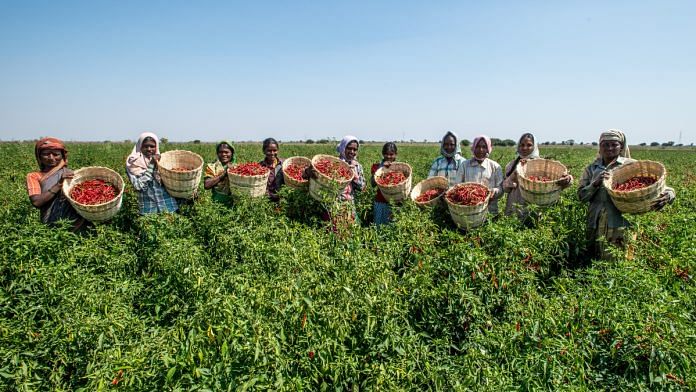Maharashtra is India’s third largest state and the country’s economic and financial hub. The state contributes 15% of India’s gross domestic product. With one of the highest number of landholdings at an average land size of 1.14 hectare, the agriculture sector contributes a significant 11.9% to the state’s economy.
Women farmers make a significant contribution to India’s and Maharashtra’s agriculture sector. To give some perspective, the Indian agriculture sector employs 65% of the total female workforce. According to the Agriculture Extension Directorate of Department of Agriculture and Farmer Welfare’s Gender Perspective in Agriculture 2021-22 report, of the total women employed in agriculture, 33% are agriculture labourers and 48% are self-employed. Specific to Maharashtra, as per the agriculture sector survey of 2015-16, women owned 14% of the operational landholdings in the state.
Like India, across developing nations women farmers face the challenges of limited access to financial and agriculture resources, education and training, as well as unfair wages and a lack of access to market opportunities. According to the UN’s Food and Agriculture Organization, global agricultural output and food security could increase by 20-30% if women had access to land, technology and financial services in rural areas.
Raising women farmers’ access to emerging agritech
The state government acknowledges women farmers’ important role in shaping Maharashtra’s agriculture sector and economy. As part of its vision of a $1-trillion economy, the state government aims to build women farmers’ capacity and access to emerging agritech and digital technologies, to ensure that they are not left behind in the digital wave and can reap its benefits while contributing to the state’s growth.
The State Women’s Development Corporation of Government of Maharashtra (MAVIM) has been at forefront of the country’s efforts to implement this vision of inclusive agritech in collaboration with the World Economic Forum’s AI4AI (Artificial Intelligence for Agriculture Innovation) initiative. MAVIM works with 1.8 million women across the state, including 1 million smallholder women farmers organised through self-help groups (SHG) at the village level and at district level through federations, to improve their livelihoods and financial health.
MAVIM’s vision is to work in partnership with private sector organizations to improve women farmers’ access to finance, inputs and markets. Over the last decades, with MAVIM’s interventions on capacity building, community strengthening and access to finance, the SHGs have been able to incrementally increase their agriculture production in both cereals (such as rice, wheat, jowar, soyabean) and vegetables (including onion, tomato, etc.)
As a future strategy, MAVIM now plans to integrate 150,000 SHGs through 361 federations to market participants like supply chain firms, financial services, input suppliers and output buyers. A key component of this strategy is the inclusive agritech initiative that plans to leverage the increasing use of mobile technologies, distributed computing and remote sensing services to enhance women farmers’ access to markets, information and inputs, ultimately improving yield, optimizing supply chains and cutting operating expenses.
Further, agritech services will open the door as an alternate livelihood option for SHGs and federations. The agritech services are gradually being delivered in ‘phygital’ model with on-ground resources to help educate, onboard and support farmers to use agritech services. This model opens up the opportunity for MAVIM SHGs and federations to act as a last-mile service delivery channel for agritech services and earn additional income. The women farmers trust the federation and its field workers and, thus, it is envisioned they will be able to also drive behaviour change to adopt new practices and technology, while safeguarding the farmers from any risks.
Areas of impact
Given the wide range of challenges and market integration opportunities with agritech, the project is working on the following areas of impact through inclusive agritech:
i. Access to advisory and inputs: Precision agriculture know-how and farm advisory services shared through multiple channels based on different existing and new data sources (soil health cards, weather data, farm/tractor-based sensors) to improve yield and optimize use of resources, impacting the cost of production.
ii. Access to market: Women farmers face challenges in accessing markets due to inefficient supply chains and information asymmetry. They lack access to storage, quality testing and logistics services, which forces them to sell their produce at lower prices in local markets. Tech-enabled platforms and solutions will address these inefficiencies and improve market access for farmers, leading to higher returns and reduced post-harvest losses.
iii. Digitization of federations: As MAVIM federations envision being integrated with markets, there is a need to improve their business operations through digitization. The digitization may include accounting, regulatory and compliance, storage, sales, and return processes etc. This in turn will generate data that will help them and agritech providers offer customized agritech services to SHGs and their members.
As a first major activity project, MAVIM, in partnership with the Forum, organized the first private sector roundtable in August 2023 on farm-to-market value chain transformation. The roundtable was attended by 12 private sector companies and, as a next step, MAVIM plans to launch a digital agriculture framework in January 2024 to onboard private sector agritech partners.
The role of MAVIM is critical in the transition towards a more empowered and inclusive agriculture sector. This organization is making a significant contribution towards the transformation of agriculture into a more sustainable and equitable industry by promoting gender inclusivity by utilizing digital tools and offering opportunities for community strengthening and skill development. MAVIM’s inclusive agritech project will act as a lighthouse for other states and nations that aim to work on inclusive digital technology as means to enhance women farmer’s prosperity and wellbeing.
This article was originally published in the World Economic Forum.



